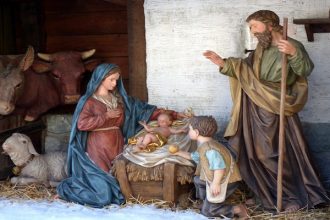“What is your name?”
That’s the question Moses asked God when God told Moses that he was to go to Pharaoh and demand that he let the people of God go free:
“Moses said to God, “Suppose I go to the Israelites and say to them, ‘The God of your fathers has sent me to you,’ and they ask me, ‘What is his name?’ Then what shall I tell them?” (Ex. 3:13).
Up to this point in the Old Testament, we’ve seen the significance of names. God had already changed the names of Abram, Sarai, and Jacob after encounters with Him. When they encountered God, the fabric of their identities was altered and God signified this change by changing their name. And that’s what Moses was really asking.
In the Old Testament, a name was much more than the means by which you could address someone. A name was a description of a person’s character. Moses was asking God, “Who are you really? And who are you to tell me to go to Pharaoh and make such a demand?”
The Lord answered with his name: Yahweh.
There was good reason for Moses’ question. Though the Israelites were already familiar with the name Yahweh (Gen. 12:8; 26:25; 28:13), they had been enslaved for centuries without any word from this God. Perhaps Moses was voicing the curiosity of many more of his kinsmen when He asked the Lord about His name. When Moses asked God about His name, he was asking, “What does Your name signify?” In other words, Moses was asking in light of these long years of suffering, who are you?
Perhaps you can identify with that. Perhaps you, too, know the feeling of reading the promises of God to the believer in Christ in the Bible. And then you look closely at your life circumstances and wonder who this God who would make such claims. It’s during such times when we, too, might look to God and ask about His true identity: “Are you really the God I’ve read about? Are you really the God who promises to never leave or forsake me? Are you really the God who works all things for good?”
This is why the names we find for God matter. It’s not so that we know what to call Him; it’s so we know who He is. And who is He? He is:
- El Shaddai (Lord God Almighty)
- El Elyon (The Most High God)
- Adonai (Lord, Master)
- Jehovah Nissi (The Lord My Banner)
- Jehovah-Raah (The Lord My Shepherd)
- Jehovah Rapha (The Lord That Heals)
- Jehovah Shammah (The Lord Is There)
- Jehovah Tsidkenu (The Lord Our Righteousness)
Just to name a few. And every one of these names is not just a moniker; it’s a reminder of who God was, is, and always will be. The names of God are a promise to believers in Him; they call to mind the unchanging character of God and invite us to know this particular attribute of God in a given circumstance.
They invite us to know the Lord is Jehovah Shammah when we are lonely. He is Jehova Rapha when we are broken. He is Jehovah-Raah when we feel lost. And one more – He is Immanual, God with us, when we are reminded daily of how much we need His grace and mercy.
It is as the psalmist told us in Psalm 7:9:
Those who know your name trust in you,
for you, Lord, have never forsaken those who seek you.
Subscribe to MichaelKelley.co
Never miss a new post. Subscribe to receive these posts in your inbox and to receive information about new discipleship resources.





